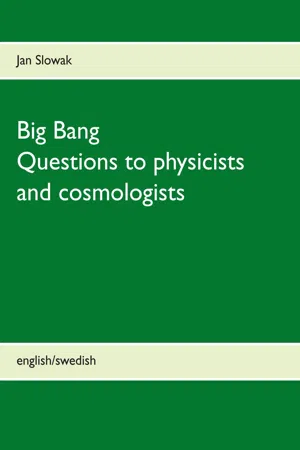
eBook - ePub
Big Bang - Questions to physicists and cosmologists
Jan Slowak
This is a test
- 48 páginas
- English
- ePUB (apto para móviles)
- Disponible en iOS y Android
eBook - ePub
Big Bang - Questions to physicists and cosmologists
Jan Slowak
Detalles del libro
Vista previa del libro
Índice
Citas
Información del libro
The author believes that parts of Big Bang theory is not scientifically based and therefore try to stimulate debate by taking up some concepts and ask questions to physicists and cosmologists.Författaren anser att delar av Big Bang teori har icke vetenskaplig grund och därför försöker väcka debatt genom att ta upp några begrepp och ställa frågor till fysiker och kosmologer.
Preguntas frecuentes
¿Cómo cancelo mi suscripción?
¿Cómo descargo los libros?
Por el momento, todos nuestros libros ePub adaptables a dispositivos móviles se pueden descargar a través de la aplicación. La mayor parte de nuestros PDF también se puede descargar y ya estamos trabajando para que el resto también sea descargable. Obtén más información aquí.
¿En qué se diferencian los planes de precios?
Ambos planes te permiten acceder por completo a la biblioteca y a todas las funciones de Perlego. Las únicas diferencias son el precio y el período de suscripción: con el plan anual ahorrarás en torno a un 30 % en comparación con 12 meses de un plan mensual.
¿Qué es Perlego?
Somos un servicio de suscripción de libros de texto en línea que te permite acceder a toda una biblioteca en línea por menos de lo que cuesta un libro al mes. Con más de un millón de libros sobre más de 1000 categorías, ¡tenemos todo lo que necesitas! Obtén más información aquí.
¿Perlego ofrece la función de texto a voz?
Busca el símbolo de lectura en voz alta en tu próximo libro para ver si puedes escucharlo. La herramienta de lectura en voz alta lee el texto en voz alta por ti, resaltando el texto a medida que se lee. Puedes pausarla, acelerarla y ralentizarla. Obtén más información aquí.
¿Es Big Bang - Questions to physicists and cosmologists un PDF/ePUB en línea?
Sí, puedes acceder a Big Bang - Questions to physicists and cosmologists de Jan Slowak en formato PDF o ePUB, así como a otros libros populares de Biological Sciences y Science General. Tenemos más de un millón de libros disponibles en nuestro catálogo para que explores.
Información
That is how much literature anywhere that treats the Big Bang theory. But I will stick to the allegation above and I write as little as possible and as simple as possible.
The beginning of everything
There is nothing more amazing, nothing more fascinating than the human ability to think!
And there is nothing more fascinating than our universe with all its stars and galaxies.
How is it then with the Big Bang? Big Bang is the cosmological standard model, that explains how the universe arose, how it develops and what will become of it in the future.
From the first contact with the Big Bang theory, I was its opponent, I could not accept it.
Everything we had read in school, in physics and chemistry lessons, was based on the
following motto:
ex nihilo nihil fit!
following motto:
ex nihilo nihil fit!
What are saying proponents of the Big Bang theory?
That everything was created in a huge explosion: everything, space, time, matter and energy.
In one of the many books that deal with this topic stands:
There was an explosion of space (and time and matter and energy) is happening everywhere in the universe. How then "everywhere in the universe"? The universe had not existed yet when it was created!
It is very confusing! This is more like creation stories, creation myths.
This is not science!
This contradicts the fundamental physical laws. In this case, the first law of thermodynamics. Energy can neither be created nor destroyed, it can only change form. In a process in an isolated system the total energy always remains the same.
Question 1: Can something come out of nothing?
After a few years
The cosmological standard model says that the universe expands at a speed of about 71km / s / Mpc (Mpc = Megaparsecs, unit of length). This value is denoted by H0, is called the Hubble constant, and has been amended several times over the course of time, depends on various measurements. If you count backwards you come to a time of about 13.7 billion years ago the Big Bang.
Much has happened since then. First of all, something happened that we call inflation. In the fraction of a second, space expanded by a factor of 1028.
Then there was calmer in about 380,000 years. But it was dark! There was no light! And there was no one who could have said "Let there be light!". But there was something! There was matter. And energy! There were electrons, nuclei and other particles. After the above time interval, the temperatu...
Índice
- Dedication
- Table of Contents
- 1) English/Engelsk version
- 2) Swedish/Svensk version
- Copyright
Estilos de citas para Big Bang - Questions to physicists and cosmologists
APA 6 Citation
Slowak, J. (2016). Big Bang - Questions to physicists and cosmologists (1st ed.). Books on Demand. Retrieved from https://www.perlego.com/book/1759290/big-bang-questions-to-physicists-and-cosmologists-pdf (Original work published 2016)
Chicago Citation
Slowak, Jan. (2016) 2016. Big Bang - Questions to Physicists and Cosmologists. 1st ed. Books on Demand. https://www.perlego.com/book/1759290/big-bang-questions-to-physicists-and-cosmologists-pdf.
Harvard Citation
Slowak, J. (2016) Big Bang - Questions to physicists and cosmologists. 1st edn. Books on Demand. Available at: https://www.perlego.com/book/1759290/big-bang-questions-to-physicists-and-cosmologists-pdf (Accessed: 15 October 2022).
MLA 7 Citation
Slowak, Jan. Big Bang - Questions to Physicists and Cosmologists. 1st ed. Books on Demand, 2016. Web. 15 Oct. 2022.